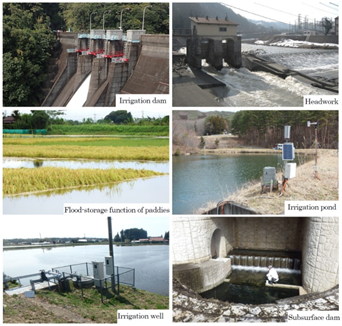The development of flood risk prediction methods to mitigate flood damage and technologies for watershed flood control using cultivated fields and reservoirs with the background of frequent heavy rainfall disasters are major issues. In addition, with the enactment of the Basic Law on the Water Cycle, consideration for the maintenance and restoration of a sound water cycle is also required for water utilization. In order to evaluate the characteristics of the water cycle in watersheds, mainly in rural and mountainous areas, we are conducting hydrological observations to understand the actual conditions and constructing a distributed water cycle process model with the consideration of diverse usage of agricultural water. Through these efforts, we will work to elucidate the effects of climate change on the water cycle in rural areas and food production.
Annual groundwater use for agriculture is 2.87 billion m3 in Japan (Ref: Ministry of Agriculture, Forestry and Fisheries: 2011). Groundwater recharge, one of the multiple functions of agriculture, is fed by the infiltration of irrigation water and rainwater from farmlands and supports the conservation and utilization of groundwater resources. However, when this function declines due to changes in meteorological and hydrological phenomena under climate change, the broad basin, including rural and urban areas, is concerned with being negatively impacted. For the preservation of sound water cycles and sustainable use of groundwater resources, we will develop methods for investigating and modeling groundwater flow systems and methods for climate change impact assessment and adaptation strategies.

Members
- TSUCHIHARA Takeo (Leader)
- SHIRAHATA Katsushi (Deputy Leader)
- MINAKAWA Hiroki
- KUBOTA Tomijiro
- AIHARA Seiya
- TAKADA Asari
- FUKUMOTO Yuya
- YOSHIDA Takeo




